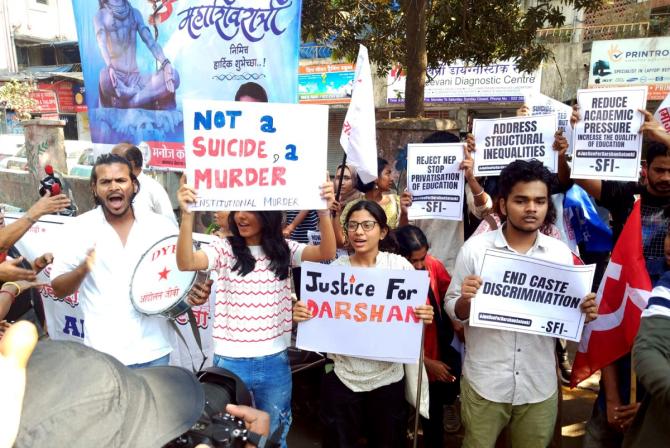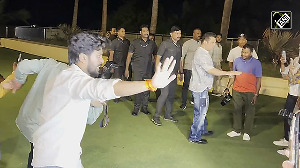'The government should immediately enact an Act to make caste discrimination a criminal offence and lay down a procedure similar to that of the Anti-Ragging Act.'
'Ragging has nearly been eliminated because it is treated as a criminal offence.'
'Similar procedure should be used in case of caste discrimination.'

It is not one or two suicide cases, but 122. Yes, you read it right.
There were 122 cases of Scheduled Caste/Scheduled Tribe and Other Backward Classes students dying by suicide between 2014 and 2021 in India's higher educational institutions.
There have been many committees formed in the past two decades to solve this problem, but no concrete results have been achieved on the ground as evidenced by the recurring suicides of students from underprivileged backgrounds.;
The most recent death by suicide is of Darshan Solanki at the Indian Institute of Technology-Bombay.
The recurring incidents of suicide made Chief Justice of India Dr Dhananjay Chandrachud remark that he was disturbed by incidents of students from marginalised communities taking their lives in educational institutions like the IITs and National Law Universities.
Syed Firdaus Ashraf/Rediff.com spoke to Professor Sukhadeo Thorat, former chairman, University Grants Commission who helmed a committee to find out why deaths by suicide occurred on Indian campuses.
Professor Thorat is the author of Blocked by Caste: Economic Discrimination in Modern India and B R Ambedkar: Perspective on Social Education and Inclusive Policies.
Could the root cause of caste discrimination on college campuses be the belief that caste is decided by birth, as propounded in the Manu Smriti?
The roots of caste discrimination are in the social organisation of the Hindus, namely the caste system and untouchability.
Caste discrimination necessarily involves treating the equal unequally. The untouchables were denied equal social, economic, cultural and religious rights, including the right to education, for several centuries.
Manu's law was torn down in the Constitution and it assures equality in law and of equal opportunities.
The Constitution recognised the principle of non-discrimination and banned untouchability and made it an offence.
To give effect to the Constitutional provision related to untouchability, the government enacted the Untouchability Offence Act in 1995, later renamed in 1979 as the Protection of Civil Rights Act.
Another law, known as the SC/ST (Prevention of Atrocities) Act, was enacted in 1989. However, although there has been an improvement in the situation, caste discrimination persists despite laws in many spheres, if not all.
The legacy of the past continues in the present. The past lives in the present.
Children pick up caste in family and society, which is reflected in their behaviour towards lower caste students in higher education institutions.
What is the empirical evidence on caste discrimination in higher educational institutions?
Empirical evidence related to caste discrimination emerged when the suicides happened. For instance, some 122 cases of suicide were reported during 2014-2021 in which it was mostly SC/STs.
However, a systematic empirical evidence came out by a committee set up by the All India Institute of Medical Sciences in 2008 under my chairmanship.
The AIIMS report was followed by a study by the National Institute of Educational Planning and Administration of few state universities, under-graduate colleges and National Institute of Technology, and later by Professor Sukumar of Delhi University, a study published by Oxford in 2022 based on primary survey of five central and five state universities.
The Scheduled Caste cell at IIT-Bombay conducted a student survey on caste discrimination, including a survey of the impact of caste discrimination on the mental health of SC/ST students.
The AIIMS survey revealed discrimination of SC/ST students by high caste students, teachers and administration in various spheres.
In it, about 76% reported bias in evaluation, 88% in marks obtained, 84% in viva, 85% in less time by teachers during lab assessment, and 76% of examiners asked caste questions.
In case of discrimination of SC/ST students by high caste students, 72% of SC/ST students reported caste bias in selection of class representative, 76% in sharing information, 88% isolation and exclusion in interaction and peers, 78% feel discriminated, about 68% in participation in cultural events, SC/ST students reported discrimination in the dining hall, particularly in exclusion in private messes, indirect segregation in hostel and harassment.
The study by Sukumar confirmed the discrimination in these spheres. The NIEPA study also brings out the persistence of discrimination in state universities and colleges.
Both studies brought out deeper insights on the nature of discrimination through caste studies and personal accounts by students.
The NIEPA study brings out discriminated religious minorities students and Dalit and Adivasi girl students.
The surveys conducted by IIT-Bombay indeed revealed the nature of discrimination, and humiliation on a regular basis in various ways and forms.
The humiliation assumes various forms such as attempt to know the caste through rank/JEE, expressing anti-reservation sentiments, stereotype, stigma in term of quota students, low merit, lazy, lack of hygiene, sarkari jamai etc.
The survey on the impact of mental health indicated that one-fourth of the SC/ST students reported mental health problems.
These surveys show that students carry caste consciousness which results in group action in the form of contempt and anti-social attitude towards the SC/ST students.
What legal policies did you suggest to minimise discrimination?
Caste discrimination still persists because of government neglect in developing legal safeguards.
Till 2012 the UGC has not enacted any regulations against caste discrimination. Kapil Sibal, as education minister, directed the UGC to enact the regulations in 2012. But these are not taken seriously by the educational institutions.
What is required is an act similar to that banning ragging, that is to make caste discrimination a criminal offence.
Any act of discrimination on the part of high caste students, teachers and administration should be treated as a criminal offence.
Ragging has nearly been eliminated because it is treated as a criminal offence and an appropriate administrative set-up is created to deal with cases of raging.
Similar procedure should be used in case of caste discrimination.
The 2012 regulations rightly identified the forms of discrimination in the educational institutions. But the government is not taking an interest, it is biased against SC/ST students.
It took the initiative for general students by enacting the Anti-Ragging Act, but it did not do so despite a promise by the government at the time of Rohith Vemula's suicide.
Now recently, the UGC has brought out the same old redressal mechanism and administrative procedure to deal with cases of caste discrimination, which I am sure will not address the problem because of the insensitivity of the administration.
The government should immediately enact an Act to make caste discrimination a criminal offence and lay down a procedure similar to that of the Anti-Ragging Act.
There is the Scheduled Castes and Scheduled Tribes (Prevention of Atrocities) Act that SC/ST students could take recourse to?
This Atrocities Act covered limited spheres of discrimination in educational institution.
If you see the regulations of 2012 (external link), there are details about caste discrimination.
You need a separate law for caste discrimination in universities/colleges/other educational institutions and till that does not come into effect, caste discrimination will go on in college campuses.
In Dalit student Darshan Solanki's suicide case a student was arrested although IIT-Bombay did not find any evidence that he was discriminated against on the basis of caste.
The case is in court and it would not be appropriate to give an opinion at this stage. But the survey conducted by the SC cell in IIT-Bombay has clearly brought out the caste discrimination in very serious forms, more serious than may have been involved in Solanki's case.
How do you sensitise upper caste meritorious students towards SC/ST students?
The caste attitude is built in the family and caste network in society. It is the parents who influence the children and build negative prejudice and attitude among them.
The students enter schools and higher education with these prejudice and negative attitude, and anti-social feeling.
So we have to unlearn these values among students in education institutes. How do we do that?
In the USA they dealt with the issue of racial and colour discrimination. I have written about this in my article in The Hindu during Rohith Vemula's time.
In the USA, when they discovered their campuses are diverse as they had White Americans, Black Americans, Latin Americans and Asian Americans, they began to realise that there was a problem of discrimination in universities.
The department of education (in the US) asked the association of colleges and universities to look into the issue and make suggestions in 2000. The committee recommended a course of 'civic learning and democratic engagement' for students which was implemented in many universities.
The students were made aware about inequality, racism, sexism, colourism and gender discrimination. They were then guided on how to overcome that discrimination.
When students learnt about it, they started to develop respect towards other communities. White students also visited Black community localities to sensitise them. They did this for the last 10 years and when they reviewed this in 2010, they found out that there was a significant improvement in discriminatory practices among students.
I have been telling the Indian government to introduce similar courses in our country to sensitise students about caste, religion, language, gender and other kind of discrimination, but without any outcome.
I also suggested to the government to give remedial courses to students who come from rural areas and are first generation students. But unfortunately it is not taken seriously by the educational institutions.
To make it more effective, the UGC should pass regulations to make the remedial assistance programme compulsory to improve English language and core subjects. This will assist students to improve their academic performance and take away the psychological pressure.
JNU is an example of the positive impact of the 'personalised remedial assistance programme' introduced in 2000.
The 2012 regulations have provisions for the establishment of an equal opportunity cell and (the appointment of an) anti-discrimination officer to implement and also carry out measures related to course in civil learning, an academic assistance programme and other issues.
It is high time the government take immediate steps on the above, which it promised to the Hyderabad university students and avoid the blame for incidents of suicide in the future.
We have so many Dalit organisations at the IITs, so don't the students reach out to them before taking the extreme step?
My article in Satish Deshpande's book The Problem Of Caste (Orient Blackswan) examined 14 suicide cases. It emerged from the survey by the SC cell at IIT-Bombay that caste discrimination and humiliation are a day to day phenomenon, which at times lead to ugly comments, which normal students fail to handle.
We get an idea from the open sharing of personal experience by an IIT-Bombay student.
He observed, "Once an officer in the administration insulted me in front of everyone for my academic performance. He asked me about my grade. He opened the computer and saw my grade and said, 'This is what you are performing, look at this, what is this. Looking at this, no one will support you. Even the dean will reject your request for late fee payment'.'
'That day, when this man trashed me in front of everybody, it was one of the bad days of my life. And that day I felt very bad and I cried a lot and I got some very bad thoughts in mind but somehow passed that phase.'
The NIEPA study quotes the derogatory comments of an ugly nature to Dalit girls. 'Quota se aayee ho ya kothe se aayee ho? (are you from quota or from 'kotha', meaning brothel?)'
These examples give an idea of the humiliation and its nature by high caste students. Some SC/ST students absorb it, some do not and are pushed to the wall.











 © 2025
© 2025